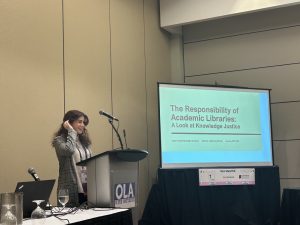Learn about a librarian’s research into 2SLGBTQ+ Libraries and Archives, preserving queer history, and current activism efforts.

A Path to Knowledge Justice through Indigenous Collections

Academic libraries hold the responsibility for their faculty, students, and associated researchers both within their policies and their collections. They are often constrained by arbitrary boundaries that continue to uphold and sustain white supremist values and fail to consider communities outside of these artificially constructed lines. It is through the understanding of knowledge justice – and critical race theory as an underlying philosophy – that academic libraries can expand their responsibilities to encompass and support underrepresented communities.
As a student intern at The University of Toronto’s Robarts Library, I assist with the creation of original metadata for an Indigenous newspaper, The Eastern Door. The acquisition and preservation of this Kahnawake newspaper at our institution showcases the importance of a shifting responsibility that academic libraries have the means to undertake. Coupled with ideas expressed by LIS professionals and librarians within a collection titled Knowledge Justice: Disrupting Library and Information Studies Through Critical Race Theory (Leung & López-McKnight, 2021), The Eastern Door functions as a counter-voice within our collection. It communicates the experiences of a community that is in the margins within the academic library setting. By centering relationality and building on the relationships formed, we created reciprocal trust, which can lead to more instances of our institution pursuing knowledge justice.
My Lightning Strikes talk at the 2024 OLA Super Conference allowed me to present and explain this intersection of my work and the hard work of others. It gave me a chance to stand up in front of academic librarians and ask them to reflect on what their roles are in upholding white supremacist values and policies, and persuade them to reconsider and shift towards cultivating academic institutions that value knowledge justice. My talk was a call to establish and continue to build on trust between our institutions and communities that have been underrepresented. To foster knowledge justice within academic libraries, we need to acknowledge that we are able and willing to do so, to listen to those who critique long-standing ideologies and policies within the profession, and to collaborate with the intention of tangible equity as the outcome.
The Eastern Door is part of our collection, and something similar might find its way into yours. With it comes a new responsibility that academic libraries can shoulder: the preservation of underrepresented cultural and community materials that will lead to continued trust and collaboration, further solidifying the pursuit of knowledge justice.
To the OCULA council, other Lightning Strikes presenters, and everyone who listened: thank you. I am very honoured and grateful for the opportunity to bring forth these values and critical theories to OCULA council this year as one of two student representatives.
References
Leung, S. Y., & López-McKnight, J. R. (Eds.). (2021). Knowledge justice: disrupting library and information studies through critical race theory. The MIT Press.
—
Sahar Kasiri-Motlagh (she/her) is a second year Library and Information Science student at the University of Toronto’s iSchool, working within the metadata department at Robarts Library.


